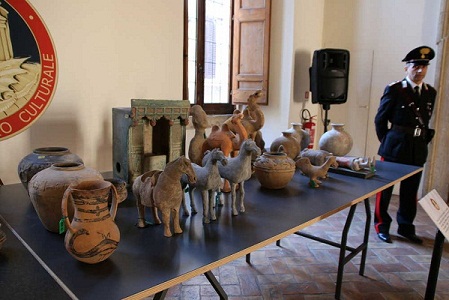Italy to return ancient pots, sculptures to China

Rome: Almost 800 ancient pots and sculptures are heading home to China, after Italy announced it would return the illicitly traded artifacts.
The items have been found to resemble those uncovered during archaeological excavations in provinces around China, including Gansu, Qinghai and Sichuan.
Some date back as far as the Neolithic period, with more recent items hailing from the Ming Dynasty (907 to 1664), according to a statement released Friday by Italy’s Ministry of Cultural Heritage and Activities.
Authorities are yet to explain how the 796 artifacts ended up in Italy, though a statement confirmed that they were “of illicit origin.” Investigators in Monza first examined the items after they were put on sale in the nearby town of Roncadelle, with Chinese authorities later confirming their provenance.
Last November, a court in Milan ordered that the items be returned to China, although the government’s announcement was seemingly timed to coincide with President Xi Jinping’s visit to Rome.
Ancient looted artworks returned to Italy by Christie’s auction house
Ancient looted artworks returned to Italy by Christie’s auction house
The move comes as the two countries signed a symbolic agreement that will see them working together to fight illegal art trafficking. Italy’s culture minister, Alberto Bonisoli, said the arrangement marked an important step in relations between the two countries.
“The most important way to protect (cultural relics) is combating the illegal cultural relics market,” he said in Rome on Saturday. “We must cooperate to make transactions of illegally gained cultural relics unprofitable.
“We are proud of being able to return to our friends the objects we have found as they represented the identity and heritage of the Chinese people.”
The announcement was made as Italy became the largest economy to sign up to Beijing’s “Belt and Road” initiative. Italian support is being seen as a major victory for President Xi’s flagship trade and infrastructure project, which aims to link China to Europe, Africa and Asia through a series of new ports, railways and roads along land and sea trade corridors.
The relics include ancient pots and sculptures. Credit: Italy’s Ministry of Cultural Heritage and Activities
Professor Quentin Parker, who teaches cultural heritage at Hong Kong University, said there was a growing trend of countries repatriating artifacts — especially to China.
“China has been very active in pushing for the repatriation of objects (that) have clearly been shown to have been looted from Chinese tombs, for example,” he said in a phone interview, adding that China’s political strength gave it greater leverage when requesting the return of historical items.
“It’s the political message that’s important here,” he added. “The artifacts themselves are a mixed bag of various times and ages and qualities. They (museums) will make an effort to repatriate objects when there’s significant political pressure.”
The deal between China and Italy comes amid a series of high-profile calls for historical artifacts to be returned to their countries of origin. Last November, France gave 26 works of art back to Benin, more than a century after it took them from the west African nation.
The UK and Belgium have also received calls from foreign governments seeking the return of allegedly stolen museum items.
The deal between China and Italy comes amid a series of high-profile calls for historical artifacts to be returned to their countries of origin.
The deal between China and Italy comes amid a series of high-profile calls for historical artifacts to be returned to their countries of origin.
“There are museums the Western world over that are full of artifacts which were acquired under dodgy circumstances, going back,” he said. “China has had so much of its cultural wealth destroyed and also stolen over centuries, and especially over the last few decades, so it’s trying to make a stand and say, ‘We need to protect our cultural heritage and we’d like to get our objects back.'”
China has signed agreements with more than 20 countries on anti-theft, anti-excavation, illegal smuggling of cultural relics, according to the country’s National Cultural Heritage Administration.
A separate statement released by Italian authorities said the stolen goods are expected to be exhibited in Beijing in 2020.





